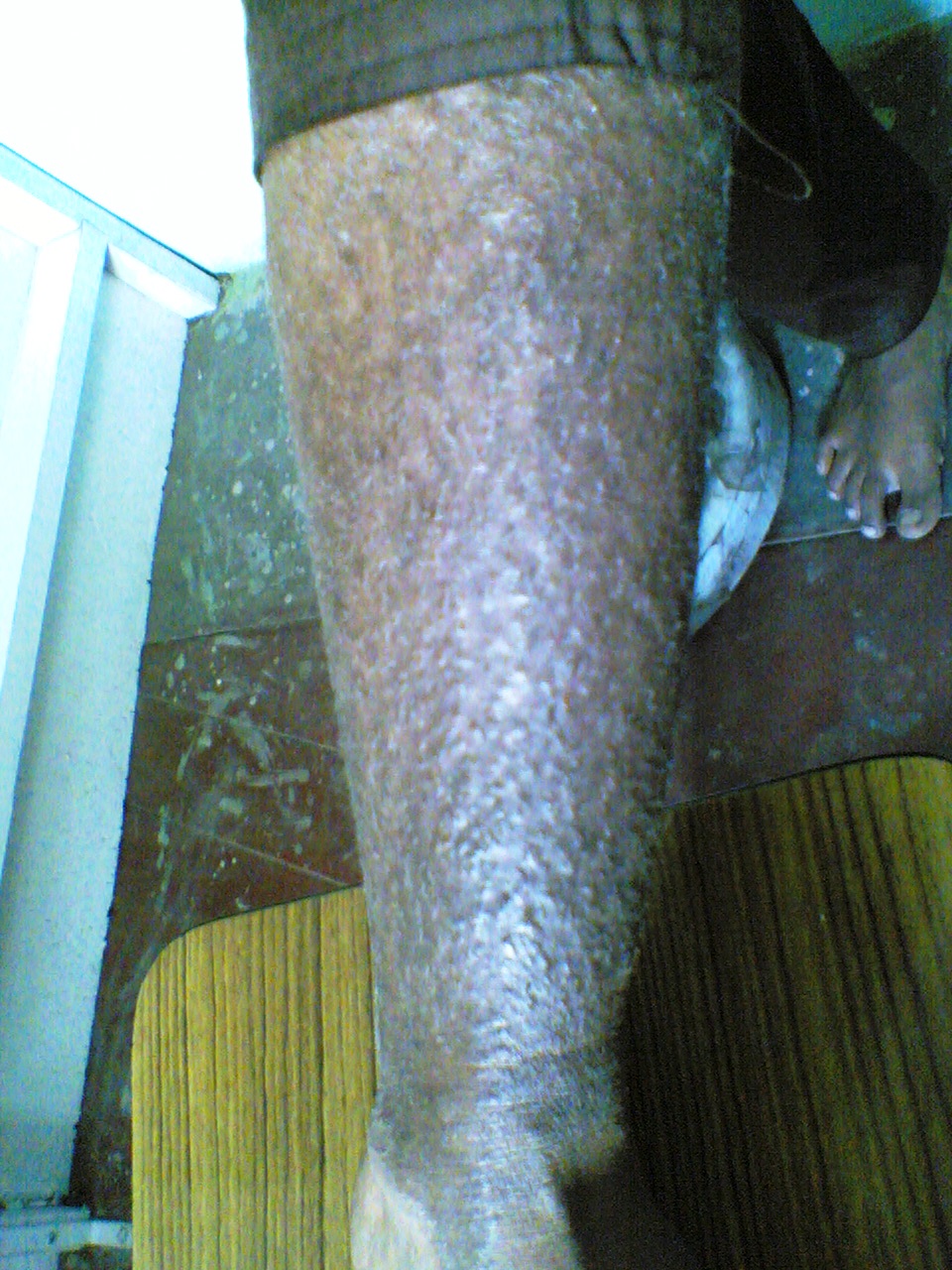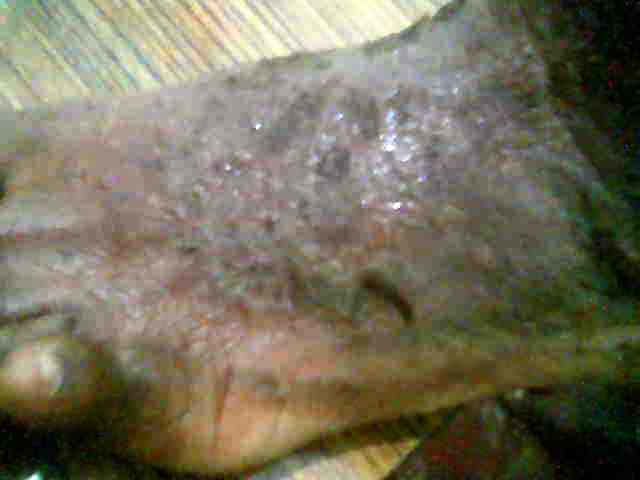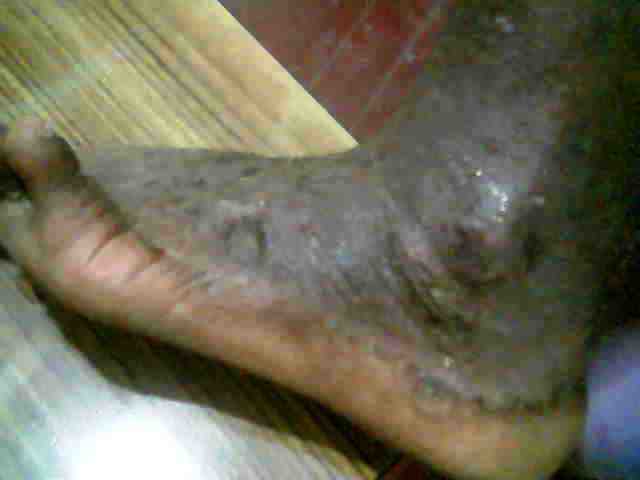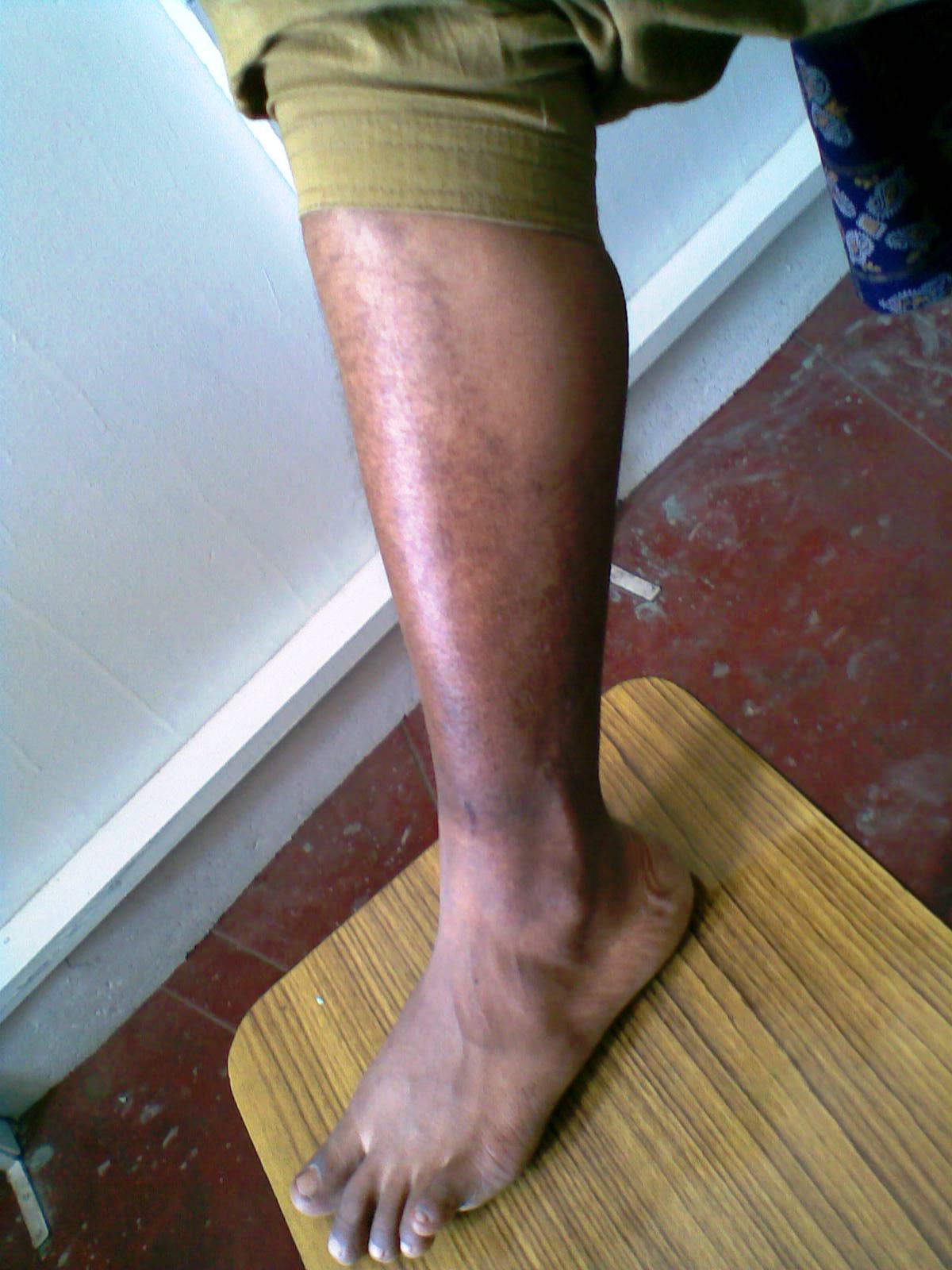Eczema - Befroe Treatment

Eczema - After Treatment
.jpg)
ECZEMA / Atopic DERMATITIS
ECZEMA / Atopic DERMATITIS
The terms eczema and dermatitis are now used synonymously. They refer to a distinctive reaction pattern of the skin showing a combination of signs which depend on the duration of rash and type of eczema.
CAUSE
Based on the aetiology, eczemas are divided into two basic groups:
1. Exogenous - This can occur due to contact with some irritant or allergen
2. Endogenous - This group contains all other types of which cause and mechanism is poorly understood. Many factors like heredity, hypersensitivity, fungal infection, senile changes, venous stasis etc are implicated in various forms of endogenous eczema.
WHAT ACTUALLY HAPPENS?
It is not very well understood. In acute stage of eczema, oedema of the epidermis and intra-epidermal vesicles form. In chronic stage there is thickening and pigmentation of skin.
SIGNS AND SYMPTOMS
Acute Eczema
· Redness ,swelling, usually with ill defined margins
· Papules, vesicles, and more large blisters
· Exudation and cracking of skin
· Scaling of skin
· Itching in and around the lesion
Chronic Eczema
· All the above plus
· Thickening and lichenification (a dry leathery thickening with increased skin margins is secondary to rubbing and scratching and is most often seen in Atopic eczema.)
· Fissures and scratch marks
· Pigmentation of the skin in and around the lesion
COMPLICATIONS
Super infection - most often with bacteria (staph-aureus) and yeast (Candia). Super infection is encouraged by the use of local steroids.
HOW IT IS DIAGNOSED?
Usually eczemas are diagnosed clinically. Patch test and prick test may be required for allergens.
WHAT TO DIFFERENTIATE FROM?
· Simple pruritis(itching)
· Fungal, bacterial, and other infections
· Exfoliative dermatitis
CONVENTIONAL TREATMENT
Topical application of steroids and oral anti-allergic drugs form the main stay of treatment.
WHAT ELSE CAN I DO?
Avoid any allergen or irritant that may be causing the problem.
Eczema More Information
Eczema (Atopic Dermatitis) is an inflammation of the skin. It results in itchy, red, thickening and scaling skin eruptions. The dominant symptom is itching, which can be severe. Eczema is not contagious. The most common type of Eczema is Atopic eczema.
Common Causes of Eczema:
· Inheritance
· Environmental Factors
· Specific allergies to foods
· Secondary infection
· Wool next to the skin
· Pet animals (fur)
· Soaps or detergents
· Dust mites and pollen
Cause of eczema depends upon the type of eczema the person is suffering from. Eczema is considered to be hereditary. Studies reveal that a person is prone to eczema if his family has a history of closely linked conditions like hay fever and asthma. Irritants like smoke, chemicals, detergents, solvents and so on, can aggravate eczema. Even weather conditions can lead to aggravation of the condition. Excessive stress, heat and emotional stress are other aggravators of eczema. Sometimes blood circulation problem in the leg can also cause eczema. Deficiency of vitamin B6 causes eczema.
Eczema is also called dermatitis. It is a group of skin disorders.
Following are the different types of Eczema:
· Atopic eczema
· Allergic contact dermatitis
· Irritant contact dermatitis
· Infantile seborrhoeic eczema
· Adult seborrhoeic eczema
· Varicose eczema and discoid eczema
Atopic dermatitis is the most common type of eczema. It mainly occurs among infants and small children. In more than 90% of cases, eczema is found to occur in children below 5 years of age. It is a non-contagious disease.
Eczema Symptoms:
Following are the symptoms of eczema:
· Itching
· Redness on skin
· Dry and flaky skin
· Itchy blisters
· Inflammation on skin
· Small bumps on forehead, neck and cheek
· Rough and thickened skin.
Symptoms of eczema are more severe on the folds.
HOMEOPATHIC TREATMENT FOR ECZEMA, ALLERGIC DERMATITIS
Homeopathy offers very good treatment for eczema, but the approach used by homeopaths is very different from that of conventional treatment. Homeopaths usually do not give anything to apply topically. Instead they try to remove the basic disposition/sensitivity to develop such a lesion using internal medicine. This approach not only successfully removes the eczema but also removes the possibility of development of other hypersensitivity disorders like asthma after the eczema is cured. To find the proper remedy a homeopath collects all the past medical history of the person, his/her family history, his/her physical and psychological characteristics etc. All this information helps the homeopath to find a remedy which not only will remove the eczema but will also remove the disposition to acquire such diseases. As a note of caution I would like to add here that after a proper remedy is given the eczema may occasionally (not often) show a mild flare up. This should not worry the patient as it is often considered a good prognostic sign by homeopaths.
But which medicine will work in a particular case can only be judged by a trained homeopath.
In homoeopathic method of treatment we have good effective medicines for these complaint, Homoeopathic medicines have no side effects. Long course of treatment is helpful to reduce these problems
Click Here to Know about Homoeopathic Treatment
http://treatmentt.blogspot.com/2009/11/eczema-atopic-dermatitis-treatment.html
1-atopic dermatitis1- before treatment

1-atopic dermatitis2- before treatment

1-atopic dermatitis3- before treatment

1-atopic dermatitis1- During treatment

1-atopic dermatitis1- After treatment

